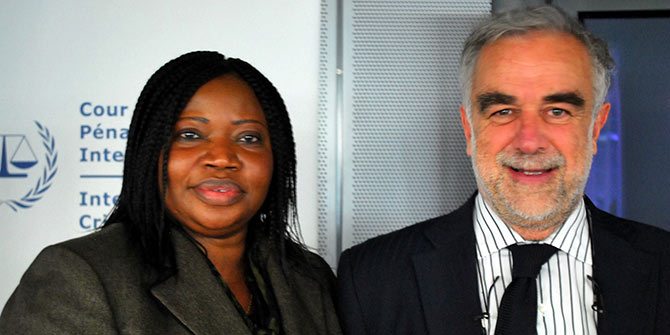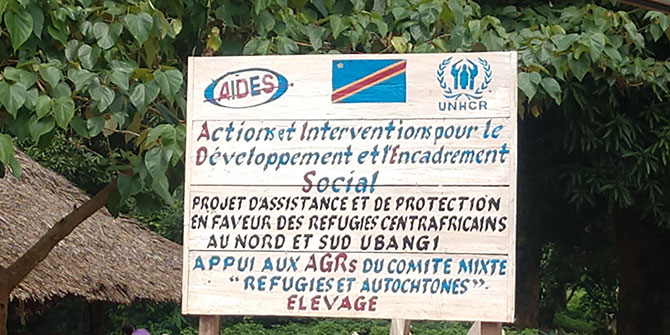Rachel Ibreck and Alex de Waal argue that, despite the ongoing violence, South Sudan is not a lawless society and courts can contribute to ending the conflict.
In the course of recurrent wars, South Sudanese people have suffered numerous atrocities with little or no opportunities for accountability. The peace agreements of 1972 and 2005 had no provisions for justice. But there is now a strong consensus that perpetrators of war crimes and crimes against humanity in the 2013 war must be brought to account if the terrible litany of violence against civilians is to end. People affected by the conflict want justice and civil society and regional institutions have also backed demands for an end to impunity. The 2015 Agreement on the Resolution of the Conflict in South Sudan includes provision for a Hybrid Court, drawing on both international and South Sudanese law and personnel, to prosecute individuals responsible for international crimes during the conflict. Among the offences to prosecuted should be famine crimes: the acts of robbery and violence that have reduced the inhabitants of one of the most fertile countries in the world to starvation. Yet the pursuit of justice cannot wait for the guns to fall silent, nor should it be confined to an engagement with statutory justice system through a Hybrid Court.
Right now, the challenges for seeking justice for war crimes might seem insuperable. The domestic courts are over-stretched and under-resourced and would struggle, even if the government had the political will to bring prosecutions against its own ministers and generals. The political obstacles to setting up the hybrid international tribunal are significant and, if or when it does happen, it can only bring a tiny number of cases relative to the wrongs that people have suffered.

There is another more enduring problem too. Violence is historically persistent and pervasive, making it difficult to distinguish ‘war’ from ‘peace’. When things are peaceful, it represents a lull—the ‘inter-war’—rather than a peace in which people can have some confidence. Transitional justice cannot be achieved when there is no credible transition, and cannot be pursued if it means failing to protect people who remain at risk. Is it meaningful to call a handful of war criminals to account if the fighting continues and day-to-day criminality proceeds unchecked? And do people reckoning with dire political, social and economic uncertainty on an everyday basis feel that justice is met when a handful of their violent oppressors stand trial? Recent research in northern Uganda suggests they do not. The principal challenge is therefore to develop an agenda for justice that is politically transformative—which makes government and military routinely accountable to the people; promises all citizens equal regard and dignity before the law; and also affords them direct forms of social and economic protection.
Throughout the turmoil and displacement, one institution concerned with the regulation of social and economic life prevails: local courts. Wherever there is a community of South Sudanese, we invariably find a court of some kind—either officially sanctioned or established by the community itself to resolve disputes and minimise violence. The Justice and Security Research Programme (JSRP), which examines the functioning of public authorities in conflict-affected countries, has been drawn towards the courts as a uniquely resilient institution. JSRP research has focused on all kinds of courts: statutory courts, presided over by judges recognised and salaried by the government; well-established customary chiefs’ courts; and also the courts improvised by displaced communities, for example in the United Nations Protection of Civilians (PoC) sites.
Customary courts are ubiquitous and extraordinarily busy, despite the conflict, as demonstrated in recent JSRP research. Where statutory courts have survived, they have also innovated and adapted to their local contexts. People continue to try to find peaceful solutions to all manner of disputes through the courts, including familial and criminal matters. The judgments they receive are inconsistent and often reinforce social inequalities by discriminating against women and imposing harsh penalties upon young people. But there is also evidence that the courts are responsive to new circumstances and that they continue to evolve amid conflict and disruption. And while it is rare to bring local government officials and soldiers to account through either statutory or customary mechanisms, there are some cases that demonstrate that it is possible to do so.
Thanks to the extensive documentation of over 600 court cases by South Sudanese paralegals and community activists in their work for the JSRP, it is possible to identify the dilemmas that the courts face and ways to improve the system. This research reveals not only what is happening in courts, but also what can be done. The research highlights the creative approaches of chiefs and judges, drawing on various sources of law. In some cases, the courts deliver carefully balanced judgments, but often, especially where women are concerned, they entrench discrimination and abuse. An important finding is that detailed recording and publication of court processes is itself a means to pursue reforms, allowing problems to be revealed and local deliberations to take place on how to prevent injustices.
The courts are at risk in a highly militarised and polarised environment. Any regional and international support for transitional justice must engage in ways that can both promote the civil authority of courts and ensure that they do more to protect human rights. The chiefs, judges and community activists who strive to deliver justice need resources to sustain and develop their work, including education, training, materials and funds. Any inputs of these kinds should begin at the local level, and involve not only chiefs, judges and lawyers, but also members of the most vulnerable groups affected by their decisions. Many judicial and legal practitioners are ready to learn—especially from one another. The starting point for advancing justice in South Sudan must surely be to build upon the capabilities of the existing system and to support the people who are trying to improve everyday practices.
Local courts are learning institutions. The label ‘customary’ may mislead: they are not static relics of the past, but are adaptable problem-solvers. They have incorporated new laws and been responsive to changing circumstances, including new ideas of rights. Those that have improvised just responses to difficult situations could share their experiences, and spread best practices. Courageous efforts to bring powerful actors to account, in either both customary and statutory forums, could be highlighted as important precedents. Ways of counteracting revenge and ethnic polarisation could be examined and improved. The costs of justice, including fees and fines, could be reviewed with attention to what is fair and appropriate in light of the current circumstances. Communities also could be better equipped to identify, record and challenge corrupt or discriminatory judgments.
From afar, it is easy to despair about the state of South Sudan: it appears that nothing is working. And indeed there is much that is desperately dysfunctional. But turn the lens and bring into focus those local public authorities that actually work, and we will see the courts. They function despite horrendous difficulties, and with modest assistance, they can do better.
Most importantly, the courts teach us that South Sudan is by no means a lawless society. Courts are an important part of everyday life in the community, and a panoply of laws, and punishments—ranging from fines to compensation and imprisonment—are routinely imposed on citizens. Both customary and statutory courts uphold restorative principles, but they do not do so exclusively. Perpetrators of violence can expect to receive harsh penalties. Court judgments often perpetrate injustices; they are often questionable from a human rights perspective, and can reflect bias, discrimination and corruption of various kinds. Yet the imperative of the courts to resolve disputes and promote local security in a civil manner is exemplary. It tells us that South Sudan is not a legal vacuum, rather the problem is that political and military leaders and their followers have been exempt from the rule of law.
In the history of southern Sudan, the state has consistently acted as the entity that can kill without being called to account, while the possibilities for civil order and protection have had to be improvised in local arrangements, often through customary courts. To achieve peace in South Sudan, the association of the state with impunity has to change. Such politically transformative justice might be strengthened by ad hoc measures including the hybrid court, but cannot simply be imposed from above. Justice must also proceed from what already exists, learning lessons from practical experiences. It would be asking too much for a low-level court—especially a customary court—to bring charges against senior officials. But after examining extensive records of court processes and judgments we can be certain that prosecutions and punishments are part of South Sudanese culture and a primary means to manage disputes and respond to violence at the local level. This customary principle of empowering courts to resolve conflict and penalise violence should now be incorporated into the political realm.
Rachel Ibreck (@racibreck) is a Lecturer in Politics and International Relations at Goldsmiths University of London.
Alex de Waal (@WorldPeaceFdtn) is Executive Director of the World Peace Foundation and a Research Professor at The Fletcher School at Tufts University and a LSE Visiting Professor.
The views expressed in this post are those of the author and in no way reflect those of the Africa at LSE blog or the London School of Economics and Political Science.






It seems the report is missing the TOC and first page. Could you please check? Thank you